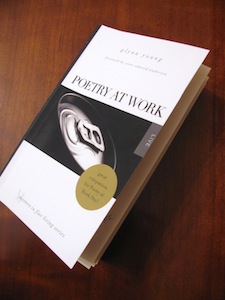“It is difficult to get the news from poems, yet men die miserably every day for lack of what is found there.” So wrote William Carlos Williams, one of America’s great modernist poets. Williams knew something about how and why men die, and about the root causes of their despair. He spent his days, and often nights, working as a pediatrician. Williams wrote many of his poems between house calls on a prescription pad he kept in the car, at stoplights and at the end of a day of treating patients. A few of his poems were directly concerned with his practice; “Complaint” is one:
They call me and I go.
It is a frozen road
past midnight, a dust
of snow caught
in the rigid wheeltracks.
The door opens.
I smile, enter and
shake off the cold.
Here is a great woman
on her side in the bed.
She is sick,
perhaps vomiting,
perhaps laboring
to give birth to
a tenth child. Joy! Joy!
Night is a room
darkened for lovers,
through the jalousies the sun
has sent one gold needle!
I pick the hair from her eyes
and watch her misery
with compassion.
—Complaint, by William Carlos Williams
Many poets mix poetry with other professions. This is a product of our age. (As poet Robert Graves said, “There is no money in poetry, but then/ there is no poetry in money either…”) We all do something else to earn a living whether it is teaching, doctoring, banking, or fund raising.
There are many fine examples of poets who worked in the business world: Wallace Stevens was a vice president of the Hartford Accident and Indemnity Co.; T.S. Eliot was a banker with Lloyd’s and later an editor at the publishing house of Faber; James Dickey, a poet best known for his novel, Deliverance, started out as a copy-writer for the ad firm that represented Coca-Cola and was later creative director for Atlanta’s largest advertising firm; Richard Hugo spent thirteen years with Boeing before becoming one of our most influential teachers of poetry; and among leading contemporary poets, Dana Gioia was formerly marketing vice president of General Foods Corporation. The list grows.
Curiously, however, very few of these poets chose to write about their daily work. It is as if they left their professional selves at the office and only became poets at home. “I keep them completely separate, ” Stevens said. It must have been a difficult separation. Perhaps this is because poetry and business, at least on the surface, appear to form an unlikely alliance. Business people tend to be action- and results-oriented, whereas poetry is more concerned with process. Moreover, there are the stereotypical images of the poet as lazy and shiftless, a dreamer not a doer. We think of Maynard G. Krebs—a bearded, bongo-playing, unwashed, unemployable beatnik. By way of illustration, here is a poem by British poet Basil Bunting called “What the Chairman Told Tom”:
Poetry? It’s a hobby,
I run model trains.
Mr. Shaw breeds pigeons.
It’s not work. You don’t sweat.
Nobody pays for it.
You could advertise soap.
Art, that’s opera; or repertory—
The Desert Song.
Nancy was in the chorus.
But to ask for twelve pounds a week—
married aren’t you?—
you’ve got a nerve.
How could I look a bus conductor
in the face
if I paid you twelve pounds?
Who says it’s poetry, anyhow?
My ten year old
can do it and rhyme;
I get three thousand and expenses,
a car, vouchers,
but I’m an accountant.
They do what I tell them,
my company.
What do you do?
Nasty little words, nasty long words,
it’s unhealthy.
I want to wash when I meet a poet.
They’re Reds, addicts,
all delinquents.
What you write is rot.
Mr. Hines says so, and he’s a schoolteacher,
he ought to know.
Go and find work.
—Basil Bunting, “What the Chairman Told Tom”
Poets, too, often seem uneasy in the role of businessman. I wrote a poem many years ago, while working for an international publishing agency in New York. “Drink Meeting at the Grand Hyatt Sun Garden” wasn’t a very good poem, but it well illustrated my own discomfort:
Jazz standards fill the atrium,
black and white and one uniform shade of gray
—is this a Woody Allen film?
I’m waiting for Soandso on business,
not my business,
but the people I work for, theirs—
Any moment Woody will walk in
with Mia Farrow or Somebody,
an entourage, paparazzi.
He’ll head straight for my table,
and shake my hand;
the press will want to know
who I am, and I’ll no longer
be “a minor poet, not very conspicuous.”
I fight the urge to bolt
out of the SunGarden bar
and find some dark, unmonikered pub,
like those my father frequented.
I realize the discomfort he must have felt
when he’d visit the clean, well-lighted
establishments of Tokyo, or LA, or Miami
on business, not his
but the people he worked for, theirs—
This is not my world:
a foreign post for a poet
and accidental businessman.
I suspect they’d throw me out
if not for my Brooks Brothers suit
and American Express
card, not mine
but the people I work for, theirs—
Soandso is late, or lost,
or has forgotten…no,
it turns out she’s been waiting
in the lobby, fifteen minutes, twenty,
only just now thought
to check the bar—“Silly me…”
No Woody, no Mia, no Diane Keaton.
(But wait, isn’t that Mr. Shawn by the piano?
And isn’t that Donald Trump on the divan?)
Just a meeting, information shared—
perhaps, one day, we could be friends—
business transacted,
not my business,
but what has become mine—
I light a cigarette after Soandso has gone.
“Are you finished with this one, sir?”
I order another drink
and finish my poem. This
is my business.
The world is my office.
We must be feeling more comfortable with one another or with ourselves these days. Over the past decade more and more poets are coming out of the board room and are more open about their corporate lives in their writing. This is a good thing, both for poetry and for business. We need a greater understanding of the emotional ties and the spiritual side of the work we do. So much of our lives are spent among this certain group of people, who are not our family and not always our friends, but who nevertheless represent important relationships.
Together, we are a corpus, an enterprise of humanity, and there is much to be learned from our interactions. Poetry can be a means to tap into the stories we share; for poetry, with its economical use of language, connects us with our compassionate selves as managers and as business people. Poetry can teach us how to find the balance within life and work, rather than between life and work. We need poetry for exactly what can be found there and what it can bring to our lives in the office.
Leading management guru, Peter Drucker says that our “abiding challenge is to make people’s strengths effective while making their weaknesses irrelevant.” To do this, managers must pay close attention, must be mindful. So, too, must poets: observation, attention, and articulation are three essentials for writing poetry. Truly, poetry and business have more in common than the fact that both stress the importance of a good “bottom line.”
Poet and consultant David Whyte looks forward to the time when “every individual can feel as though they are giving their gift.” Whyte, whose clients include AT&T, Arthur Andersen, and Boeing, strives to help corporate leaders understand “there are assets other than net assets that are important.”
One of the most outspoken of the new “business poets” is James Autry, who until recently was a senior vice president of the Meredith Corporation’s Magazine Group. He has written some wonderful poems about how “business is revealed and made manifest through people, ” and about this enterprise of humanity, that most of us find ourselves in today. Here is one called “What to Know About Hanging On”:
I
Why do they keep on working,
the ones who should take everything,
the disability time,
the vacation,
the wink-and-look-the-other-way extras
they could get at a time like this?
Why don’t they head for the fishing hole
they always talked about,
or the mountains,
or that spot far away from the cold,
the one they promised to send pictures
for us to hang in the garage
above our snow shovels?
Why do they make up excuses
to come in every morning
and return phone calls
and answer correspondence
and talk about next year’s sales goals
and the plan
and the earnings
and the stock price
and the chances of a takeover—
everything as ordinary as always?
II
We used to say,
as they did,
if it happened to us
we would kiss the job good-bye
and pack every remaining minute
with people we love
and things we love to do.
Through all those years
it did not occur to us
that what we really love to do
is the work—
never mind the job
with all its trappings,
those things we have to do
so we can do the work,
and never mind that we talked about
loving the company
when we really meant
loving the people.
But now, watching someone hang on,
I long to say the words we feel
but never say,
about how hard it is to show
the love of what we do together,
until we face the certainty
that it is about to end.
—James Autry, “What to Know About Hanging On”
Here’s another Autry poem:
It’s like a little murder,
taking his life,
his reason for getting on the train,
his lunches at Christ Cella,
and his meetings in warm and sunny places
where they all gather,
these smiling men,
in sherbet slacks and blue blazers,
and talk about business
but never about prices,
never breaking that law
about the prices they charge.
But what about the prices they pay?
What about gray evenings in the bar car
and smoke-filled clothes and hair
and children already asleep
and wives who say
“You stink”
when they come to bed?
What about the promotions they don’t get,
the good accounts they lose
to some kid MBA
because somebody thinks their energy is gone?
What about those times they see in a mirror
or the corner of their eye
some guy at the club shake his head
when they walk through the locker room
the way they shook their heads years ago
at an old duffer
whose handicap had grown along with his age?
And what about this morning,
the summons,
the closed door,
and somebody shaved and barbered and shined
fifteen years their junior
trying to put on a sad face
and saying he understands?
A murder with no funeral,
nothing but those quick steps outside the door,
those set jaws,
those confident smiles,
that young disregard for even the thought
of a salesman’s mortality.
—James Autry, “On Firing a Salesman”
Autry often reads his poems to groups of business people. He feels it is important to share his poetry like this because business people need “permission to admit their feelings when they have to do something like [fire an employee]. The other side of it is that they also get permission to celebrate and to be happy about the pleasure that business can provide.”
Life at work is full of small triumphs and small disappointments, big ones too. These moments shape the spirit of our working selves and we so rarely get to talk about them. Emily Hawthorne is a poet who addresses what it is like to be a woman in corporate life. Here is her poem “Merrill Lynch”:
Young scion
of a food chain family
collar and feet too large
sits in a meeting about a new stock offering
Mauna Loa Macadamia Nuts
He raises his hand:
“Shouldn’t we be concerned about the amount of cholesterol
in each nut?”
Everyone laughs.
I am in a meeting
more sales training for young brokers.
A manager without an office
is visiting ours.
He is speaking about motivation:
“Unless you know what you want and go for it,
you might as well blow your brains out.”
He has no office to manage
and his wife has left him.
I am walking down the hall
thinking about lunch and how much I hate nylons.
My big ticket has been noticed
My manager’s been friendly toward me all morning
He’s visiting the two big hitters in a corner office.
Some male bonding, I think.
He motions for me to drop by
this is quite an honor.
I walk in and say hello.
(The usual greeting is more casual)
Four smiling white men turn to me
nails polished, hair trim
The manager without an office
bares his teeth
“Hey Emily, nice ticket. Where are your knee pads?”
Judging from the laughter
this is quite funny.
I am on hold
watching the quotron blink, office babel buffeting me.
A lull, then cries of disbelief
Someone runs heavily past my cubicle
The quotron news service explains in one line
“The space shuttle Challenger exploded 71 seconds after takeoff.”
Then some news about coffee prices.
I hang up. Find an office with a television
Usually it scrolls numbers in black and white
now showing, over and over
an arcing smoke trail
then a lopsided chrysanthemum.
The sound is an announcer’s grim voice I can’t understand
Above the drone, in the tiny dark room, several brokers
are already trying to outdo each other.
“I’ll bet it was the teacher! Pushed the wrong button!”
I can’t hear the announcer so I tell them to shut up.
One turns to me:
“Lighten up, Emily.”
—Emily Hawthorne, “Merrill Lynch”
There are others, too, writing poems out of their own business lives. (H. Bruce McEver, president of Berkshire Capital, is one of the more accomplished examples.) These poets are touching the lives of others with their writing and readers recognize something of their own experience in the poems. David Whyte, in his book The Heart Aroused, describes the need for poetry in what he calls the fight to save the soul of corporate America. These poets accomplish much more than that with their poetry: they are also saving poetry by making it more relevant to people’s lives. This can only be a good thing for the future of poetry in America—and for business.
Photo by Pierre Bédat, Creative Commons license via Flickr. Post by Scott Edward Anderson, award-winning poet and author of Fallow Field. Scott has worked in a variety of business sectors throughout his career.
Browse more Poetry at Work Day resources
Browse more Poetry at Work articles
Read more poems about work
_____________________________
 Get your own free Poetry at Work Day poster and celebrate Poetry at Work Day in your workplace
Get your own free Poetry at Work Day poster and celebrate Poetry at Work Day in your workplace
Visit the official Poetry at Work Day poster page to order
_____________________________
Poetry at Work, by Glynn Young, foreword by Scott Edward Anderson
“This book is elemental.”
—Dave Malone
- Eating and Drinking Poems: Maya Angelou’s “Phenomenal Woman” - January 30, 2014
- Poetry at Work: Poetry and Business Life - December 4, 2013

 Get your own free Poetry at Work Day poster and celebrate Poetry at Work Day in your workplace
Get your own free Poetry at Work Day poster and celebrate Poetry at Work Day in your workplace
Maureen Doallas says
Fine post on a fascinating subject.
It would be good to know which professional women have written poetry that has so wide an audience.
Looking forward to reading Glynn’s book.
Maureen Doallas says
Clare Morgan (UK) has written extensively on the subject, including the book “What Poetry Brings to Business”; she is a novelist and short story writer. I don’t have a copy of the book right now, so I can’t recall if she references any poets who are women. I don’t recall coming across any recent articles that mention other than the names on everyone’s list: Gioia, Whyte, et al.
I did find a collection titled “The Boss” (McSweeney’s, 2013) by Victoria Change, who is in marketing/communications; and Janet Wong, who used to practice law, now writes full-time (she wrote “A Suitcase of Seaweed” and “Gold Luck Gold”).
I think there are probably some important socio-cultural aspects to the question I raised.
Scott Edward Anderson says
No doubt. And I’m familiar with Clare’s work, but also don’t have it at hand to reference.
I don’t know whether Emily Hawthorne continues to write poetry or if she is still with whatever Merrill Lynch is these days.
I’ll check out Victoria Change and Janet Wong’s work. Thanks for the tip.
Maybe we can build a list!
Alyce Wilson says
I enjoyed your in-depth look at this subject. It makes me think about my own subject matter in poetry and why I don’t write more often about my work (transcription work of cable news, which is its own strange saga).
Scott Edward Anderson says
Thank you, Alyce.
Maureen Doallas says
Another name we can add to our list of women who are professionals who write poetry:
Today at The Far Field Debra Revere’s poem ‘Drowning’ is posted. Revere is a research scientist who writes poetry.
Would like to read more of her work.
http://kathleenflenniken.com/blog/?p=2267